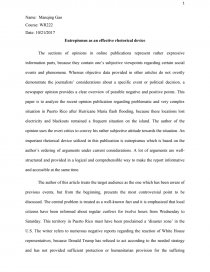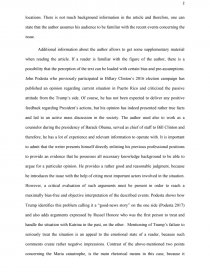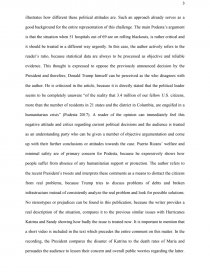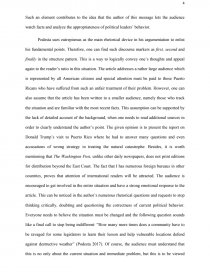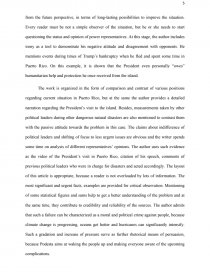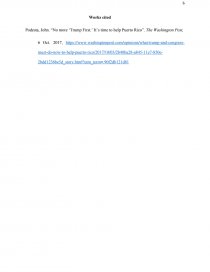Eutrepismus as an Effective Rhetorical Device
Essay by Manqing • January 24, 2018 • Essay • 1,786 Words (8 Pages) • 1,309 Views
Essay Preview: Eutrepismus as an Effective Rhetorical Device
Name: Manqing Gao
Course: WR222
Date: 10/21/2017
Eutrepismus as an effective rhetorical device
The sections of opinions in online publications represent rather expressive information parts, because they contain one’s subjective viewpoints regarding certain social events and phenomena. Whereas objective data provided in other articles do not overtly demonstrate the journalists’ considerations about a specific event or political decision, a newspaper opinion provides a clear overview of possible negative and positive points. This paper is to analyze the recent opinion publication regarding problematic and very complex situation in Puerto Rico after Hurricane Maria flash flooding, because these locations lost electricity and blackouts remained a frequent situation on the island. The author of the opinion uses the overt critics to convey his rather subjective attitude towards the situation. An important rhetorical device utilized in this publication is eutrepismus which is based on the author’s ordering of arguments under current considerations. A lot of arguments are well-structured and provided in a logical and comprehensible way to make the report informative and accessible at the same time.
The author of this article treats the target audience as the one which has been aware of previous events, but from the beginning, presents the most controversial point to be discussed. The central problem is treated as a well-known fact and it is emphasized that local citizens have been informed about regular curfews for twelve hours from Wednesday to Saturday. This territory in Puerto Rico must have been proclaimed a ‘disaster zone’ in the U.S. The writer refers to numerous negative reports regarding the reaction of White House representatives, because Donald Trump has refused to act according to the needed strategy and has not provided sufficient protection or humanitarian provision for the suffering locations. There is not much background information in the article and therefore, one can state that the author assumes his audience to be familiar with the recent events concerning the issue.
Additional information about the author allows to get some supplementary material when reading the article. If a reader is familiar with the figure of the author, there is a possibility that the perception of the text can be loaded with certain bias and pre-assumptions. John Podesta who previously participated in Hillary Clinton’s 2016 election campaign has published an opinion regarding current situation in Puerto Rico and criticized the passive attitude from the Trump’s side. Of course, he has not been expected to deliver any positive feedback regarding President’s actions, but his opinion has indeed presented rather true facts and led to an active mass discussion in the society. The author used also to work as a counselor during the presidency of Barack Obama, served as chief of staff to Bill Clinton and therefore, he has a lot of experience and relevant information to operate with. It is important to admit that the writer presents himself directly enlisting his previous professional positions to provide an evidence that he possesses all necessary knowledge background to be able to argue for a particular opinion. He provides a rather good and reasonable judgment, because he introduces the issue with the help of citing most important actors involved in the situation. However, a critical evaluation of such arguments must be present in order to reach a maximally bias-free and objective interpretation of the described events. Podesta shows how Trump identifies this problem calling it a “good-news story” on the one side (Podesta 2017) and also adds arguments expressed by Russel Honore who was the first person to treat and handle the situation with Katrina in the past, on the other. Mentioning of Trump’s failure to seriously treat the situation is an appeal to the emotional state of a reader, because such comments create rather negative impressions. Contrast of the above-mentioned two points concerning the Maria catastrophe, is the main rhetorical means in this case, because it illustrates how different these political attitudes are. Such an approach already serves as a good background for the entire representation of this challenge. The main Podesta’s argument is that the situation when 51 hospitals out of 69 are on rolling blackouts, is rather critical and it should be treated in a different way urgently. In this case, the author actively refers to the reader’s ratio, because statistical data are always to be processed as objective and reliable evidence. This thought is expressed to oppose the previously announced decision by the President and therefore, Donald Trump himself can be perceived as the who disagrees with the author. He is criticized in the article, because it is directly stated that the political leader seems to be completely unaware “of the reality that 3.4 million of our fellow U.S. citizens, more than the number of residents in 21 states and the district in Columbia, are engulfed in a humanitarian crisis” (Podesta 2017). A reader of the opinion can immediately feel this negative attitude and critics regarding current political decisions and the audience is treated as an understanding party who can be given a number of objective argumentation and come up with their further conclusions or attitudes towards the case. Puerto Ricans’ welfare and minimal safety are of primary concern for Podesta, because he expressively shows how people suffer from absence of any humanitarian support or protection. The author refers to the recent President’s tweets and interprets these comments as a means to distract the citizens from real problems, because Trump tries to discuss problems of debts and broken infrastructure instead of consistently analyze the real problem and look for possible solutions. No stereotypes or prejudices can be found in this publication, because the writer provides a real description of the situation, compares it to the previous similar issues with Hurricanes Katrina and Sandy showing how badly the issue is treated now. It is important to mention that a short video is included in the text which precedes the entire comment on this matter. In the recording, the President compares the disaster of Katrina to the death rates of Maria and persuades the audience to lessen their concern and overall public worries regarding the latter. Such an element contributes to the idea that the author of this message lets the audience watch facts and analyze the appropriateness of political leaders’ behavior.
...
...
